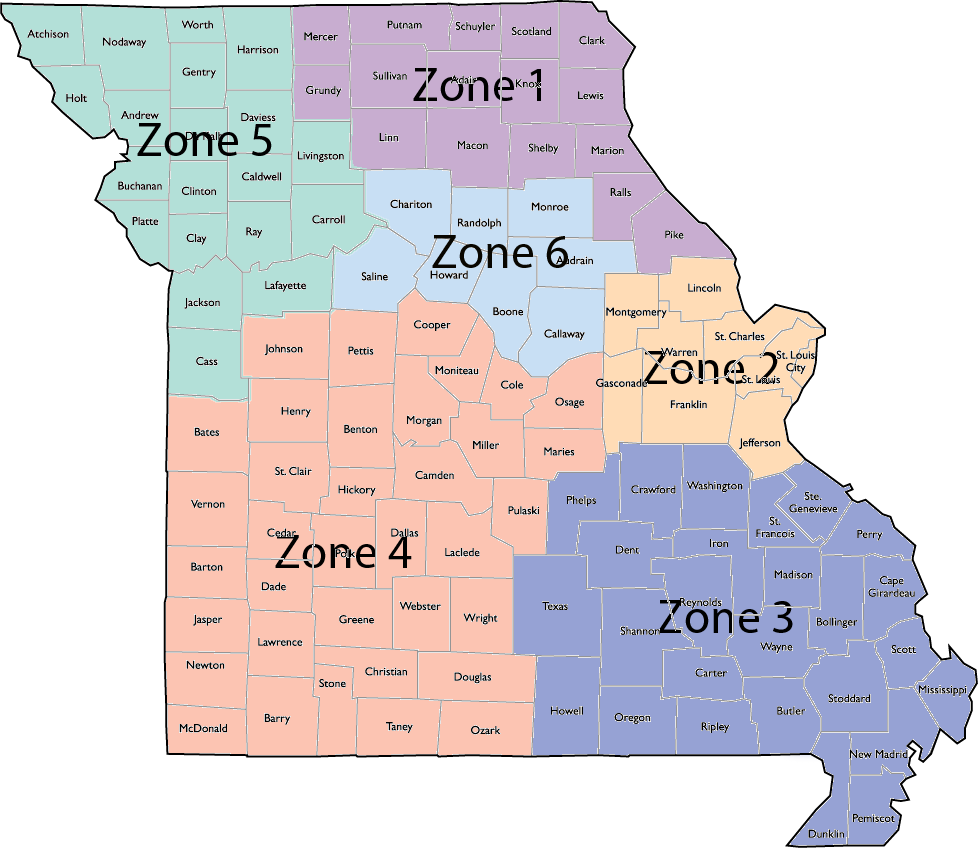People and Operations
DarkSky Missouri is a state-wide chapter divided into operating zones to ensure all areas of the state are supported.
People and Operations
Operating Zones

With the goal of making a “state-wide” chapter, IDA Missouri is subdivided Missouri into operating zones. Our forward strategy and ongoing operations make every effort to consider each zone. A key to our success with be recruiting champions for each zone.
Board of Directors
DarkSky Missouri holds board meetings on the third Thursday of the odd months of each year. The board meeting schedule is as follows:
- For 2024: 1/18, 3/21, 5/16, 7/18, 9/19, and 11/21.
DarkSky Missouri Board members serve for a term of three years and cannot serve for more than two (2) consecutive full three-year terms of office without a break in service of at least one (1) year. Board terms are divided into three classes which are staggered to expire in different years to help ensure continuity of the Board.
DarkSky Missouri has thirteen board members as follows:
Zone 1 - North Region:
- Vayujeet Gokhale, Ph.D., Assoc. Professor of Physics, Truman State University, Kirksville, MO - Term Expires 11/30/2024
- Daphne Zakarian, Truman State University, Kirksville, MO - Term Expires 11/30/2024
Zone 2 - St. Louis Region:
- Don Ficken, Missouri Master Naturalist, Kirkwood, MO - Term expires 11/30/2025
- William Neubert, St. Louis Astronomical Society, Manchester, MO - Term expires 11/30/2026
- Jean Nock, Missouri Master Naturalist, Warrenton, MO - Term expires 11/30/2025
- Jake Ronecker, Missouri Master Naturalist, St. Louis, MO - Term expires 11/30/2025
- Stephanie Todd, Missouri Sierra Club, Olivette, MO - Term expires 11/30/2024
Zone 3 - Southeast Region:
- Trish Erzfeld, Perry County Tourism, Perryville, MO - Term Expires 11/30/2026
Zone 4 - Lakes Region:
- Loring Bullard, Schoolcraft Chapter, Ozark Society, Springfield, MO - Term expires 11/30/2024
- Cathy Webb, Greater Ozarks Audubon Society, Springfield, MO - Term expires 11/30/2026
Zone 5 - Kansas City Region:
- Jackie Beucher, Astronomical Society of Kansas City, Overland Park, KS - Term expires 11/30/2026
- DeAnn Gregory, Missouri Sierra Club - Thomas Hart Benton, Kansas City, MO - Term expires 11/30/2026
- Rick Yord, Astronomical Society of Kansas City, Lee's Summit, MO - Term expires 11/30/2025
Zone 6 - Central Region:
- No representatives.
Board Officers
Our chapter officers are as follows:
- Chapter Chair, Vayu Gokhale, Ph.D., Kirksville, MO - Term expires 11/30/2024
- Chapter Vice-Chair, Stephanie Todd, Olivette, MO - Term expires 11/30/2024
- Chapter Secretary, Daphne Zakarian, Kirksville, MO - Term expires 11/30/2024
- Chapter Treasurer, Don Ficken, St. Louis, MO - Term expires 11/30/2024
Board Nominating Committee
Our chapter has a nominating committee consisting of past chapter chairs. This committee will grow as our chapter grows.
- Chapter Founder/Past-Chapter Chair, Don Ficken, Kirkwood, MO
Chapter Advisors
Our chapter has access to expertise from DarkSky International but we believe it important to draw our experts from Missouri to provide more advice specific to our state. Accordingly, we are recruiting subject matters experts from around Missouri:
- Dan Duffy, City Council, City of Ellisville, MO
- Trish Erzfeld, Perry County Heritage Tourism, Perryville, MO
- Chad Follis, Ph.D., Professor Horticulture/Greenhouse, Mineral Area College
- Terrel Gallaway, Ph.D., Professor of Economics, Missouri State University
- Vayu Gokhale, Ph.D., Associate Professor of Physics, Truman State University
- John Kraemer, Ph.D., Professor/Director of Center for Environmental Science, Southeast Missouri State University
- David Mitchell, Ph.D., Professor of Economics, Missouri State University
- Bentley Ousely, Virtual Reality Filmmaker, Astronomical Society of Kansas City
- Brett Seymoure, Ph. D., Department of Biological Sciences, University of Texas at El Paso
- Will Snyder, James S. McDonnell Planetarium Manager, Saint Louis Science Center
- Dan Zarlenga, Metro Media Specialist - St. Louis Regional Office, Missouri Department of Conservation

